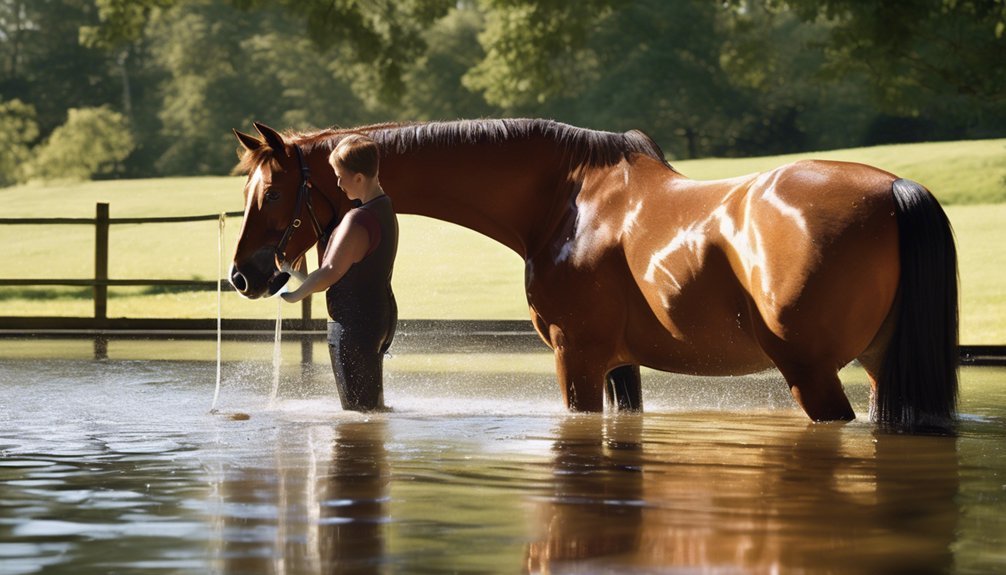
Regular bathing for your horse is more than just a grooming routine; it's essential for their overall health. It helps maintain a shiny coat and prevents skin issues by removing dirt and sweat. This practice also strengthens your bond with your horse, creating a calming atmosphere that reduces stress. But there's more to it than just aesthetics and connection. Explore how bathing can enhance your horse's well-being in ways you might not expect.
Key Takeaways
- Regular bathing enhances coat and skin health, maintaining hydration and preventing skin irritation or infections.
- Bathing strengthens the bond between horse and handler, fostering trust and positive interactions.
- It promotes relaxation, reducing stress levels through soothing rituals and gentle handling.
- Routine grooming uplifts overall mood, contributing to a happier and more balanced emotional state.
- Establishing a consistent bathing schedule encourages discipline and reinforces the importance of regular care.
Enhancing Coat Health

When you regularly bathe your horse, you're not just cleaning its coat—you're actively promoting its overall health and well-being. A clean coat enhances shine, reflecting your horse's vitality.
By integrating effective grooming techniques into your bathing routine, you can stimulate the skin and promote natural oil production. Use a gentle brush before bathing to remove dirt and loose hair.
While bathing, opt for a mild equine shampoo to avoid stripping essential oils. Rinse thoroughly to prevent residue buildup, which can dull your horse's coat.
After bathing, consider using a soft cloth or mitt to buff the coat, enhancing that beautiful shine. This intimate care not only improves appearance but also strengthens the bond you share with your horse.
Promoting Skin Hygiene
Although you may focus on your horse's coat, promoting skin hygiene is equally important for its overall health. Proper bathing enhances skin hydration and aids in irritation reduction, ensuring your horse feels comfortable and healthy. Regular cleaning removes dirt and debris that can lead to skin issues, allowing the skin to breathe and function optimally.
| Benefit | Description | Frequency |
|---|---|---|
| Skin Hydration | Maintains moisture balance | After exercise |
| Irritation Reduction | Minimizes potential skin irritation | Weekly |
| Dirt Removal | Eliminates harmful particles | As needed |
| Healthy Circulation | Promotes blood flow to the skin | Monthly |
| Bonding Time | Strengthens your relationship | Every bath |
Taking these steps not only nurtures your horse's skin but also enriches your bond with them.
Preventing Skin Conditions

Maintaining skin hygiene through regular bathing not only enhances hydration and comfort but also plays a pivotal role in preventing skin conditions that can affect your horse's health.
By washing away dirt, sweat, and debris, you significantly reduce the risk of skin irritation and the development of fungal infections. The accumulation of grime can create a breeding ground for harmful microorganisms, leading to discomfort and serious health issues.
Bathing helps to keep your horse's skin barrier intact, promoting a healthy environment. When you prioritize regular baths, you're not just giving your horse a spa day; you're actively investing in their well-being.
This simple routine can save you both from the stress of treating skin problems down the line.
Strengthening the Bond Between Horse and Handler
Bathing your horse regularly not only promotes its physical health but also serves as a powerful tool for strengthening the bond between you and your equine companion. This shared experience fosters trust building and encourages positive interaction, allowing you to connect on a deeper level. Engaging in this routine also helps your horse become more comfortable with your presence, enhancing your relationship.
| Benefits | Description |
|---|---|
| Trust Building | Regular bathing increases your horse's confidence in you. |
| Positive Interaction | Creates a calming environment, promoting emotional connection. |
| Routine Familiarity | Establishes a predictable routine that your horse appreciates. |
Checking for Injuries and Irritations

While you're bathing your horse, it's essential to take the opportunity to check for injuries and irritations that may not be immediately visible. This regular routine allows for effective injury detection, helping you spot cuts, scrapes, or swelling that could indicate underlying issues.
As you gently wash your horse, run your hands along their body, paying close attention to sensitive areas like the legs and belly. An irritation assessment is crucial, as even minor irritations can escalate if left untreated.
Look for signs of redness, heat, or unusual behavior that may suggest discomfort. By being attentive during bath time, you're not only keeping your horse clean but also ensuring their health and well-being, strengthening your bond even further.
Reducing Stress and Anxiety
When you create a regular bathing routine for your horse, you're not just promoting hygiene; you're also providing a calming experience that can significantly reduce stress and anxiety.
Bathing becomes a soothing ritual, allowing your horse to relax as you wash away dirt and tension. The warm water and gentle strokes create a sensory experience that engages your horse's sense of touch and temperature, fostering a deeper bond between you.
This routine can help your horse associate bathing with comfort, making it a positive experience they look forward to.
Improving Circulation

A regular bathing routine can also play a significant role in improving your horse's circulation. By using warm water and gentle massage techniques, you can stimulate blood flow, promoting overall health and vitality.
This practice not only helps in muscle relaxation but also enhances your horse's ability to recover from workouts or long rides.
- Warm water encourages vasodilation, improving blood circulation.
- Massaging during bathing helps release tension in the muscles.
- Improved circulation can lead to better nutrient delivery and quicker recovery.
Incorporating bathing into your care routine can create a soothing experience for your horse, deepening your bond.
With each session, you're not just cleaning; you're actively contributing to their physical well-being and emotional comfort.
Preparing for Competitions and Shows
To ensure your horse is ready for competitions and shows, establishing a consistent bathing routine is essential. This routine not only enhances competition readiness but also allows you to inspect your horse's coat and skin for any issues.
Use effective grooming techniques alongside bathing—start with a thorough brushing to remove dirt and debris before the bath. Follow up with a gentle shampoo to keep their coat shiny and healthy. Don't forget the mane and tail; a detangler can work wonders.
After bathing, dry your horse properly to prevent chills and promote comfort. This intimate grooming time strengthens your bond and helps you both feel prepared, confident, and relaxed as you approach the competition arena together.
Encouraging a Healthy Lifestyle

Establishing a regular bathing routine not only prepares your horse for competitions but also contributes significantly to their overall health and well-being.
A clean coat promotes skin health, encourages bonding, and enhances your horse's comfort. When combined with equine exercise and a healthy diet, bathing becomes an essential part of a holistic approach to your horse's lifestyle.
- Keeps skin free from irritants and parasites
- Strengthens the bond between you and your horse
- Enhances circulation and muscle relaxation
Boosting Overall Well-being
While regular bathing might seem like a simple grooming task, it plays a crucial role in boosting your horse's overall well-being. Bathing not only keeps your horse's coat healthy but also supports their immune system by reducing the buildup of dirt and allergens. The process can serve as a form of mental stimulation, engaging your horse's senses and fostering trust between you both.
Here's a quick overview of the benefits:
| Benefit | Description | Impact on Well-being |
|---|---|---|
| Immune System Boost | Reduces allergens and irritants | Healthier, happier horse |
| Mental Stimulation | Engages senses during baths | Strengthened bond with you |
| Relaxation | Calming effect on your horse | Enhanced overall mood |
With each bath, you're nurturing more than just their coat—you're enhancing their entire well-being.
Frequently Asked Questions
How Often Should I Bathe My Horse?
You should bathe your horse based on bath frequency guidelines, considering seasonal factors. In warmer months, weekly baths help maintain cleanliness, while in colder seasons, less frequent baths can prevent skin issues and discomfort.
What Type of Shampoo Is Safest for Horses?
You wouldn't want to use anything less than the best! Choose shampoos with natural ingredients and a balanced pH, ensuring your horse's skin stays healthy, happy, and as radiant as their spirit deserves.
Can Bathing Help With Insect Control?
Bathing can indeed aid insect control by applying insect repellent on your horse's coat. Regular bathing not only enhances coat health but also strengthens your bond as you care for their comfort and well-being.
Should I Bathe My Horse in Cold or Warm Water?
When deciding if you should bathe your horse in cold or warm water, consider this: cold water benefits invigorate while warm water advantages soothe. Choose based on your horse's needs and the weather conditions.
What Time of Year Is Best for Regular Bathing?
The best time for regular bathing depends on seasonal considerations and weather conditions. In warmer months, your horse enjoys cooler baths, while in colder months, ensure the water's warmth to prevent discomfort and health issues.
Conclusion
Incorporating regular bathing into your horse care routine not only enhances their coat and skin health but also nurtures your bond. As you wash away dirt and sweat, you're also washing in comfort and care, promoting relaxation and joy. Each bath becomes an opportunity to check for injuries, boost circulation, and prepare for competitions. By prioritizing this practice, you foster a vibrant, healthy life for your horse, ensuring they thrive physically and emotionally in your care.





